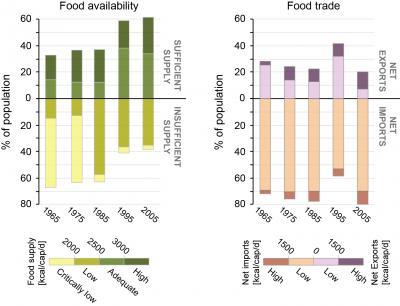Protests at economics meetings that lament globalization are done by the Agricultural 1 Percent - people fortunate enough to be born in countries where food is plentiful and cheap and they can protest rather than try to eke out a subsistence living in a difficult climate.
Yet the reality of economics defies their beliefs that trade and industry in developing nations will ruin those countries. Instead, an analysis of food availability and food self-sufficiency since 1965 by Aalto University in Finland found that food availability in the Middle East and North Africa, Latin America, China, and Southeast Asia increased substantially even though food self-sufficiency has remained relatively low.
In the 1960s and 1970s, insufficient food production in a country amounted to food shortages and starvation - the Band Aid song in the early 1980s was designed to raise money to buy food because it was believed that developing nations would never be able to grow it - but science has made it possible to grow food in lots of places where it was once difficult and globalization has caused food production deficits to be increasingly balanced through food imports.

Food availability and food trade. Credit: Miina Porkka / Aalto University
The proportion of people living in countries that are significant net importers of food has more than tripled during the period under examination. The countries of North Africa and the Middle East, for instance, have become increasingly dependent on imported food. In these countries, food availability has increased from low to a very high level, even though domestic food production has remained inadequate.
Brazil, on the other hand, has become one of the world's most important producers of food for export. In the 1960s, food supply in the country was still inadequate, but in the past decades Brazilian food production has grown exponentially and food consumption is now more than sufficient.
The study also examined dietary changes that have taken place in different countries. The proportion of people consuming large amounts (more than 15 per cent of energy intake) of animal-based nutrition has increased from 33 per cent to more than 50 per cent. This together with over consumption of calories in many countries is putting an increased pressure on the planet's limited natural resources. However, over a third of the world's population is still living with insufficient food supply.
We can fix that, if scaremongers and activists will stop hating science more than they love poor people.




Comments